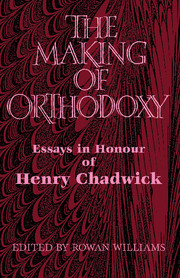Book contents
- Frontmatter
- Contents
- Preface
- List of abbreviations
- Bibliography of Henry Chadwick
- Does it make sense to speak of pre-Nicene orthodoxy?
- ‘And I have other sheep’ – John 10:16
- Reason and the rule of faith in the second century ad
- Adam in Origen
- Panegyric, history and hagiography in Eusebius' Life of Constantine
- Matthew 28:19, Eusebius, and the lex orandi
- The achievement of orthodoxy in the fourth century ad
- Eunomius: hair-splitting dialectician or defender of the accessibility of salvation?
- Some sources used in the De Trinitate ascribed to Didymus the Blind
- The rhetorical schools and their influence on patristic exegesis
- Pelagianism in the East
- The legacy of Pelagius: orthodoxy, heresy and conciliation
- Augustine and millenarianism
- Divine simplicity as a problem for orthodoxy
- The origins of monasticism
- Artistic idiom and doctrinal development
- Index of modern names
- Index of ancient and medieval names
- Index of sources
Panegyric, history and hagiography in Eusebius' Life of Constantine
Published online by Cambridge University Press: 08 October 2009
- Frontmatter
- Contents
- Preface
- List of abbreviations
- Bibliography of Henry Chadwick
- Does it make sense to speak of pre-Nicene orthodoxy?
- ‘And I have other sheep’ – John 10:16
- Reason and the rule of faith in the second century ad
- Adam in Origen
- Panegyric, history and hagiography in Eusebius' Life of Constantine
- Matthew 28:19, Eusebius, and the lex orandi
- The achievement of orthodoxy in the fourth century ad
- Eunomius: hair-splitting dialectician or defender of the accessibility of salvation?
- Some sources used in the De Trinitate ascribed to Didymus the Blind
- The rhetorical schools and their influence on patristic exegesis
- Pelagianism in the East
- The legacy of Pelagius: orthodoxy, heresy and conciliation
- Augustine and millenarianism
- Divine simplicity as a problem for orthodoxy
- The origins of monasticism
- Artistic idiom and doctrinal development
- Index of modern names
- Index of ancient and medieval names
- Index of sources
Summary
Eusebius' Life of Constantine has an obvious relevance to the making of Christian orthodoxy. It has often seemed to be a peculiarly problematical text. I had the great good fortune to be introduced to the Life and its problems many years ago by Henry Chadwick, who pronounced, in that grave and rational tone of voice which all who have known him will recall so well, that Eusebius' authorship was the only plausible hypothesis – an opinion which he later reiterated in print. At the time, I was wrestling with the problem of trying to understand Tertullian under Henry's temporary guidance, but I never forgot the remark. When I began to work seriously on the Constantinian period, I consciously adopted the transmitted and traditional attribution of the Life as a working hypothesis, which came to seem more strongly based the more I penetrated the period. Hence it is with deep gratitude and pleasure that I offer the following essay on the occasion of Henry Chadwick's seventieth birthday – all the more so since the first article which I wrote about Constantine was published in a volume celebrating the seventieth birthday of Sir Ronald Syme. Debate has moved on since 1973: here I shall be less concerned to demonstrate partially novel interpretations of Constantine and Eusebius than to apply hypotheses which I have developed elsewhere to the work which has for ever linked their two names.
The problems posed by the Life of Constantine are both literary and historical.
- Type
- Chapter
- Information
- The Making of OrthodoxyEssays in Honour of Henry Chadwick, pp. 94 - 123Publisher: Cambridge University PressPrint publication year: 1989
- 37
- Cited by



